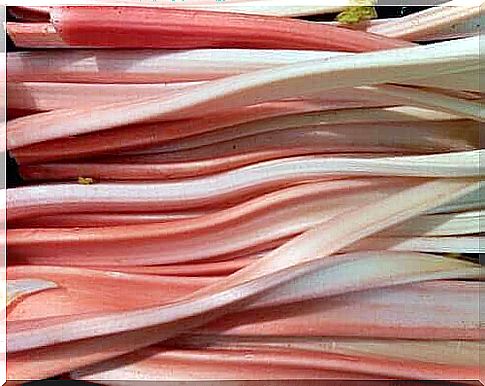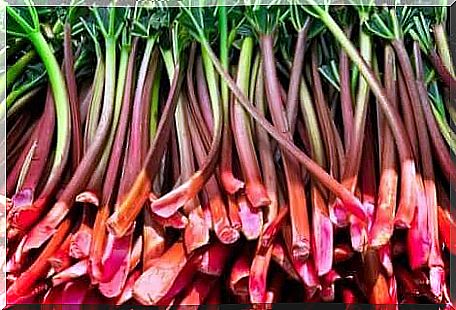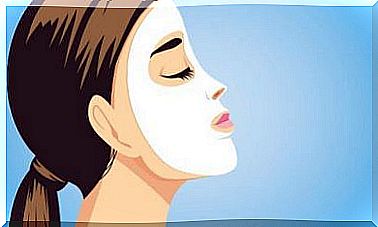Garden Rhubarb: Good Properties And Side Effects

Garden rhubarb is known for its health-promoting qualities. For example, it can regulate cholesterol levels and improve digestion. It can be used for many other things, but also has side effects. Read on and find out more about the plant.
The scientific name for this rhubarb is Rheum rhabarbarum. It belongs to the family Polygonaceae. It is also edible and you can use its stems for a variety of dishes.
Have you ever heard of the many good properties of this plant?
In the very old days, the plant was mostly used as a medicinal herb, especially its dry roots. Nowadays, people mostly use the stems for sweet soups, jams, sauces, cakes, pies and wine. It is also the main ingredient in many traditional cakes and pies.
The Nutritional Benefits of the Garden Barber
We have to mention that rhubarb does not contain very many vital nutrients and only quite a few calories. Despite this, it can be part of a healthy and varied diet and contribute to your overall nutritional needs.
According to the US Department of Agriculture , a serving of 100 g of rhubarb contains the following:
- 26 calories
- Less than 1.13 grams of fat
- 200 grams of fiber
- 1.13 grams of protein
- 5.7 grams of carbohydrates
- 1.13 grams of sugar
- 26% of the recommended daily intake (ADI) of vitamin K1
- 6% of ADI of vitamin C.
- 3% of ADI of potassium
- 1% of ADI of folate (vitamin B9)
Rhubarb also contains a little lime. But it is mostly in the form of antinutrient oxalates. Despite this, the body cannot absorb it effectively.

Rhubarb contains few calories, and can be seen in many recipes.
Health benefits of garden rhubarb
We must emphasize that there are still not enough scientific studies that can demonstrate solid evidence for the health benefits of rhubarb. However, anecdotal data and unofficial studies suggest that they may contribute to the prevention of certain diseases.
Let’s look at how.
It can help regulate cholesterol levels
Rhubarb contributes a significant amount of fiber to the diet, and it is known for its ability to regulate cholesterol levels.
In fact, a controlled study published in the Journal of the American College of Nutrition showed that the stem of this plant helped reduce total cholesterol by 8% and bad cholesterol (LDL) by 9%.
Rhubarb contains antioxidants
According to an article in Research in Pharmaceutical Sciences , antioxidants play an important role in the prevention of chronic diseases. Not only do they reduce the negative effects of free radicals. They also strengthen the immune system and act as protection against inflammation.
Garden rhubarb is a major source of antioxidants – even more so than kale, according to a study published in the International Journal of Food, Science & Technology. More specifically, the plant contains anthocyanins, which contribute to the health of the circulation, brain and skin.
Garden rhubarb benefits digestion
The fiber in rhubarb also has a good effect on digestion. Experts believe that a regular intake can help prevent and treat certain bowel problems such as constipation.
In addition, an experiment with mice from BioMed Research International mentions that the tannins in rhubarb help to regulate the absorption of water in the digestive tract. This helps prevent diarrhea.
Side effects of rhubarb

You should not overdo your intake of rhubarb as it contains calcium oxalates which can help develop kidney stones.
For most healthy adults, a moderate intake of rhubarb does not have any adverse effects. But one must realize that it is one of the most important, edible sources of calcium oxalates. This mineral is found mostly in the leaves of the plant. Therefore, you should avoid eating too many of them.
As described in a report from the BMC Nephrology, so , too much calcium oxalate leading to hyperoxaluria, which is a frequent cause of kidney stones. In addition, it can lead to kidney failure if not treated properly.
Therefore, anyone with kidney problems or a history of kidney stones should avoid eating this vegetable. In addition, you should talk to your doctor before starting to eat it regularly if you are undergoing medical treatment.
How to get the most out of garden rhubarb
It is easy to incorporate rhubarb into your diet despite the slightly sour taste. Some mix it with strawberries to get a sweet and sour taste. You can also eat it raw, even if it is not as delicious as when you eat it in a pie! In general, this vegetable is often mixed with oatmeal, salad dressings, cakes and pies with chia seeds.
What do you mean, you want to try them?









